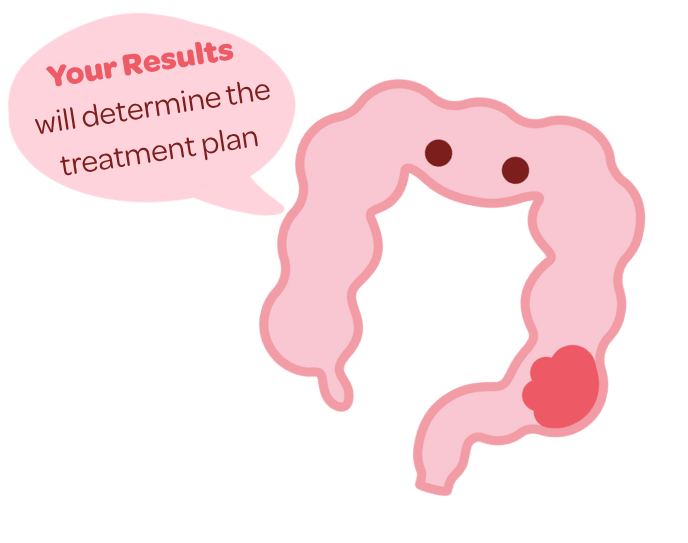Colonoscopy - Results
I’ve had my colonoscopy - what’s next?
What is my Gastroenterologist looking for?
During a colonoscopy your Gastroenterologist looks at the bowel for anything out of the ordinary.
Your bowel can have a lot going on! Inflamed tissues, polyps, haemorrhoids, burst blood vessels, lesions, growths or cancers can all cause bleeding. Your Gastroenterologist will have a good look around and if they identify any areas of concern, small tissue samples (biopsies) will be taken and sent to a pathology company for histology testing for the underlying causes.
If polyps are found they’ll be removed at the time of the colonoscopy and sent for histology. Some other issues can also be dealt with at the time of the colonoscopy. Others will wait for the results of the biopsies to determine the best course of treatment.
Normal results -
If your Gastroenterologist doesn’t find anything of concern, there will be no immediate follow up treatment needed.
It’s important if you’ve had a positive FOBT result to have ongoing monitoring with further routine FOBT tests and colonoscopies in the future. Your Gastroenterologist will make plans to contact you to organise these, usually in 12-24 months.
Abnormal results -
If areas of concern are diagnosed, they may range in seriousness from minor to needing immediate attention.
Inflammation is an area of irritation or ulceration on the colon walls. It can be caused by conditions such as inflammatory bowel disease (IBD), infection or colitis. Left untreated these conditions can cause discomfort, pain and changes in bowel habits. Your Gastroenterologist will discuss treatment options with you.
Polyps are growths on the lining of the colon. Most polyps are benign (not cancerous). Some are precancerous, which means that they can turn into cancer over time. Removal of polyps during your colonoscopy prevents them from developing into cancer. If polyps are found you’ll need routine follow up colonoscopies every year or two to ensure any new polyps are removed.
Lesions such as haemorrhoids, tears, growths, abnormal blood vessels or diverticulosis (formation of abnormal pouches in the bowel wall) can all cause bleeding. Treatment will depend on the type and severity of the lesions, and your Gastroenterologist will discuss this with you.
Cancer is the big one we’re all worried about, but early detection saves lives! If your colonoscopy finds a growth or tumour and histology testing confirms that it is cancerous, your Gastroenterologist will organise a treatment plan for you. This will usually mean a referral to a surgeon, and other specialists as needed. Your GP should also be involved in your care team. Your doctors will determine how far the cancer has spread (staging), and that will decide your course of treatment. For more helpful information see Bowel Cancer Australia


